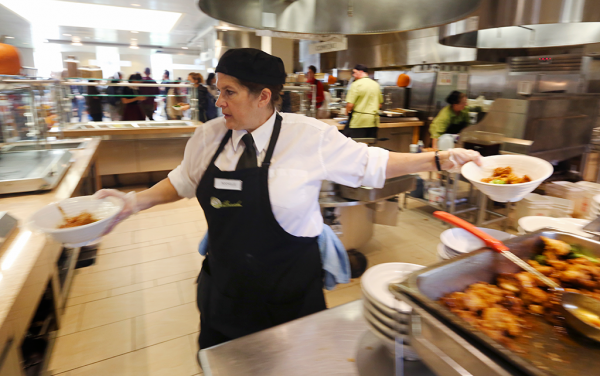Thanking Kenyon’s Unsung Heroes

The operation of a complex institution like Kenyon requires the work and support of hundreds of people each day. The work of many of these individuals happens quietly behind the scenes: debris is cleared after a windstorm; trash is removed; chairs and tables, displaced by a day’s activities in Peirce, are returned to order the next morning. In other instances, employees at Kenyon practice regular acts of kindness that make the lives of those around them better, including custodial staff and safety officers who help remove unwanted bats from campus buildings (like those in Cromwell Cottage).
This week has marked the third annual Unsung Heroes Week, an opportunity to recognize the work of our maintenance, safety and AVI staff in keeping the campus safe, clean and well-managed. The project is sponsored by a broad cross-section of organizations, including the Office of Student Engagement; student government bodies including Student Council, First-Year Council, Sophomore Class Committee, Junior Class Committee and Senior Class Committee; athletic groups including Kenyon Student Athletes, Athletes for Equality, and the swimming and diving, women’s lacrosse, and track and field teams; and Greek organizations including Greek Council, Epsilon Delta Mu, Zeta Alpha Pi, Theta Delta Phi, Delta Kappa Epsilon, Phi Kappa Sigma, Delta Tau Delta and the Archon Society.
Kenyon is dedicated to its core mission of educating students in the liberal arts and sciences. All of us who work, teach and learn here at Kenyon play a role in advancing this mission; and I’d like to lend my voice to those of the students to thank the many workers who make quiet but essential contributions to the institution’s daily operations. Thanks as well to the students who have initiated the efforts behind Unsung Heroes Week.
Expressing thanks strengthens community. But it is also good for you: recent research suggests that expressing gratitude stimulates sections of the brain responsible for stress regulation as well as regions responsible for pleasure. Gratitude is also deeply intertwined with the values of liberal education. The ancient stoics (including Seneca and Cicero), who articulated early foundational ideas of the “liberales artes” — education for citizenship that evolved into the modern concept of the liberal arts — were also advocates for the value and virtues of gratitude.
So please take time out for an extra “thank you” to employees from AVI, maintenance and safety for their service, not only this week, but as a regular part of your campus routine.
